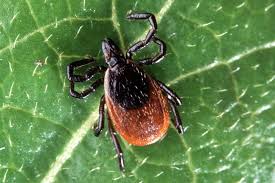
TICKS IN NEW JERSEY
I first wrote about ticks in NJ back in October of 2013. Ticks are a topic that can send goose bumps up your arms, but we should all know how to try to avoid them and what we should do if you, a family member or your pet gets one.
Part 1 New Jersey Ticks in 2013
October is an active time for adult ticks and it is important that we stay diligent with their detection. Even an Indian summer can cause these tiny creatures to become active when we often let our guard down.
In New Jersey we have four hard body ticks; The American Dog tick, the Brown Dog tick, the Lone Star tick and Deer ticks. It is the Deer tick, also known as the ‘Black legged tick’ that causes humans in our area the most concern due to the possible transmission of Lyme Disease.
Early tick detection is the surest way to avoid problems. This simply means taking a visual exam of yourself and your children every day. Deer ticks need 24-36 hours to transmit the Lyme Disease bacteria. An adult Deer tick is about the size of a sesame seed. Now with more and more deer roaming though our area we need to increase our guard.
Part 2 New Jersey Ticks update 2023
In June 2018, a man from Yonkers, NY brought a tick he found on his leg to his doctor. Surprisingly it wasn’t a known local tick. This tick was a recent introduction to America, first discovered just one year before, the Asian Long Horned Tick*. Unlike many other ticks, long horned tick likes mowed lawns and is not deterred by direct sunlight. When investigators inspected the man’s lawn, they discovered an alarming number of these ticks. The female is able to reproduce asexually which means she doesn’t have to find a mate to fertilize her eggs.
New introductions of other ticks from the Gulf Coast have alerted researchers and doctors to the growing danger they might bring. It is now more important than ever to do a complete tick body search after spending a day outside.
If you do find a tick correct removal is very important. Remove the tick carefully with tweezers and put it into a container with a moist cotton ball (an old prescription bottle works best). A good tick sample is essential if your doctor decides to have it tested. Make sure you have removed the entire tick including the head which can cause infection if you leave it in.
Do not put rubbing alcohol on the tick as it will kill the bacteria and that tick will no longer be viable for testing.
Rutgers Cooperative Extension Garden Helpline of Union County can identify your tick for you. Bring the intact tick to the Union County office at 300 North Ave East, on the 2nd floor. Please call before going to make sure someone will be there to accept your sample. For more information call908-654-9852.
Rutgers suggests you always call your doctor when you are bitten by a tick. They will know the best course of action to be taken.
*Information on the Asian Longhorned tick is from the NY Times, Joseph Goldstein.
Happy Gardening,
James

